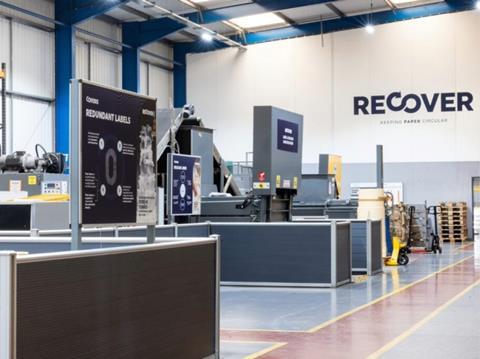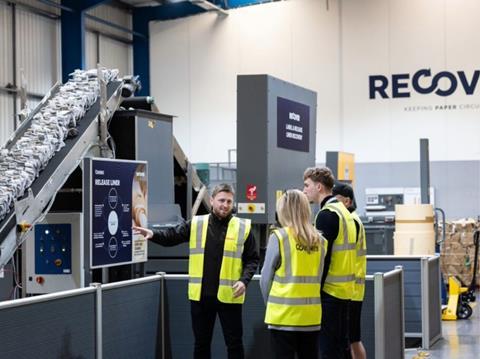
With the Sustainability Awards only a few weeks away, we hear from Adam Robinson, head of Sustainability for BU Paper at Coveris, about its ReCover Paper facility, able to process paper-to-paper recycling for self-adhesive label release liners and nominated in the Commercialized Best Practice category.
You’re a finalist in the Sustainability Awards 2025. Congratulations! To start off, could you summarize your entry, in less than 50 words?
Recover Paper is Coveris’ best practice recovery and sorting facility responsible for processing over 10,000 tonnes of production and customer waste annually. Its capabilities, services and supply chain partnerships elevate materials up the waste hierarchy, enabling Coveris’ UK label and cartonboard sites to operate with no waste to landfill.
Why do you think the judges were impressed with your entry? Tell us about what is innovative about your project and/or about its impact on packaging sustainability.
The ReCover Paper facility plays a key role in delivering Coveris’ No Waste sustainability strategy and supports customers achieve their environmental goals. With innovative technology and a forward-thinking approach to advancing the circular economy, ReCover Paper’s standout capabilities are its processing of redundant labels and paper-to-paper recycling service for release liner.
There are occasions when manufactured labels may become redundant and not required by our customers. We collect these from customers and the labels - along with make-ready waste from our internal operations - undergo careful sorting to create clean recycling streams.
Using ReCover Paper’s innovative delamination technology, label facestock is efficiently separated from release liners for maximum material recovery, enabling both components to be recycled in their own streams. The separated paper labels are processed through conventional fibre recycling routes and converted into new fibre-based products, while filmic labels are recycled into materials used in the construction industry. The recycling of the separated release liners is our second unique offering.

Release (or backing) liners, the byproduct waste from transporting and applying self-adhesive labels, have long been a recycling challenge as they are siliconised, heavily compressed, and commonly yellow in colour.
In 2024, Coveris became the first label manufacturer in the UK to offer a paper-to-paper recycling service for self-adhesive release liners. This initiative, delivered through our RafCycle partnership with UPM Adhesive Materials, allows us to collect used backing liners from our customers and send them for high-quality recycling into graphic paper. Through careful screening and segregation, we ensure the recovered liner waste is suitable for processing by a specialist recycling mill.
This service diverts liner waste from common destinations such as landfill, incineration, or downcycling into non-recyclable products and instead provides a meaningful recycling route, adding value to our label offering.
Additional waste streams managed via ReCover’s Paper facility include redundant linerless label stock (paper and filmic), cardboard label cores - of which we re-use 500,000 a year - foil, plastic and cardboard.
Finally, can you tell us about the ongoing development of your project, e.g. how your innovation/initiative has been received by the industry, or what the next steps are in commercialization/product development?
The ReCover Paper facility is essential in driving Coveris’ No Waste strategy and we are constantly trying to improve and enhance its performance and offering. We aim to maximize its output via quality recycling streams or alternatives where this is not possible, diverting waste from landfill. In 2024, 87% of waste was recycled and 13% was sent for incineration.
Our priority is the 13% that is currently incinerated, and we are exploring new avenues and technologies to recycle more of this waste. Through collaboration with suppliers, industry groups and our network of recycling partners, we believe we can increase recycling and keep more material within the packaging industry. We are currently trialling ways to incorporate our waste into the products that we manufacture.
The facility has recently been integrated in our ReCover business, unifying our paper and plastic recycling capabilities. As part of this, we have introduced enhanced customer information and education to facilitate visits and help our customers improve their waste segregation and solutions, in addition to identifying opportunities for collaboration. Feedback has been fantastic and ReCover Paper has already been recognised this year at other industry awards and secured long-term supply agreements with our customers.
Elsewhere in the ReCover business, Coveris is partnering with sustainability tech leader Nextek to help drive a breakthrough in food-grade plastic film mechanical recycling. Using Nextek’s COtooCLEAN technology and our expertise in film extrusion, the goal is to turn post-consumer flexible packaging into high-quality, food-grade recycled material.
The winners of the Sustainability Awards 2025 will be announced at the Sustainable Packaging Summit, taking place in Utrecht on 10-12 November. The Summit mobilizes leaders of the FMCG value chain, policymakers, NGOs, recyclers and investors to collaborate, remove barriers and identify opportunities on the road to sustainable transformation.
To learn more or register, visit: https://www.packagingsummit.earth/2025
If you liked this story, you might also enjoy:
The ultimate guide to the Packaging and Packaging Waste Regulation in 2025
How are the top brands progressing on packaging sustainability?
Everything you need to know about global packaging sustainability regulation in 2025
The key to increasing the use of reusable packaging in supermarkets














No comments yet